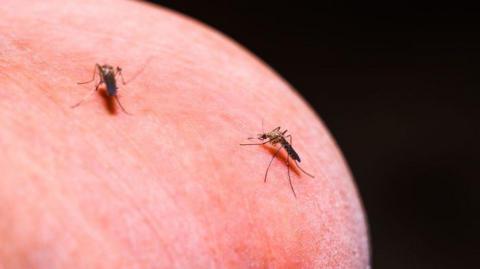The researchers analysed malaria's DNA to find possible weak spots while it is infecting mosquitoes.
They took a large library of potential drugs and narrowed it down to a shortlist of 22. These were tested when female mosquitoes were given a blood-meal contaminated with malaria.
In their article in Nature, the scientists describe two highly effective drugs that killed 100% of the parasites.
The drugs were tested on material similar to bed nets.
"Even if that mosquito survives contact with the bed net, the parasites within are killed and so it's still not transmitting malaria," said Dr Probst.
"I think this is a really exciting approach, because it's a totally new way of targeting mosquitoes themselves."
She says the malaria parasite is less likely to become resistant to the drugs as there are billions of them in each infected person, but less than five in each mosquito.
The effect of the drugs lasts for a year on the nets, potentially making it a cheap and long-lasting alternative to insecticide, the researchers say.
This approach has been proven in the laboratory. The next stage is already planned in Ethiopia to see if the anti-malarial bed nets are effective in the real world.
It will take at least six years before all the studies are completed to know if this approach will work.
But the vision is to have bed nets treated with both anti-malaria drugs and insecticide so that if one approach doesn't work, then the other will.
